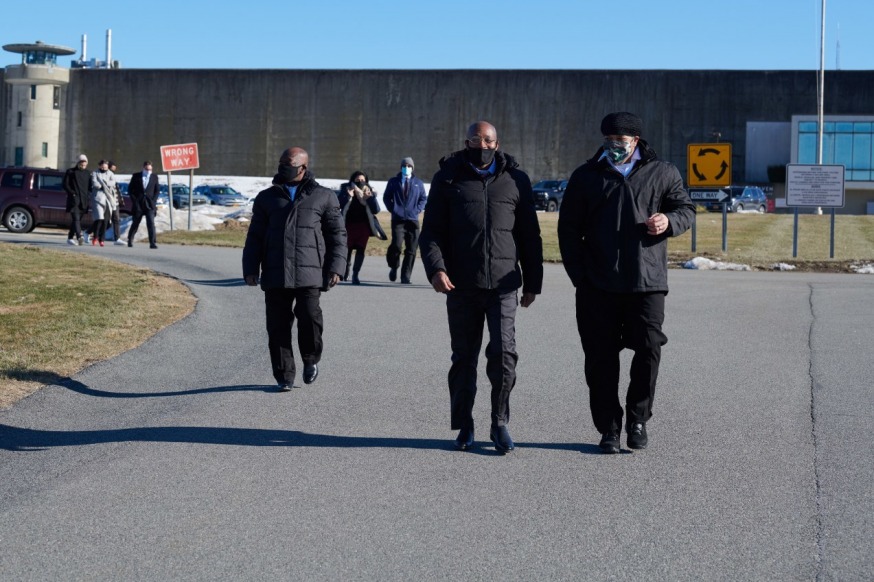
Left to Right: Rohan Bolt, George Bell and Gary Johnson Release from Green Haven Correctional Facility earlier this month. Photo Credit: Klaus Enrique
March 24, 2021 By Christina Santucci
A fundraiser set up to help three men who were wrongfully convicted of a 1996 double homicide and spent 24 years behind bars has raised more than $40,000.
The funds are being distributed among George Bell, Rohan Bolt and Gary Johnson who had been wrongfully convicted of killing Ira “Mike” Epstein and NYPD Officer Charles Davis during a botched robbery in Astoria on Dec. 21, 1996.
A Queens Supreme Court judge vacated their convictions on March 5, and Bell, Bolt and Johnson were later released from prison.
A GoFundMe was launched shortly after their release with the goal of raising $100,000.
The men were released after Judge Joseph Zayas found that the Queens District Attorney’s office and case prosecutors in the 1990s had deliberately withheld key information in the case that raised doubt as to their guilt.
The judge later filed his 29-page decision, which called the actions of one of the case’s prosecutors – Charles Testagrossa – “mind boggling.”
Judge Zayas wrote that, “Under no circumstances could the prosecutors in these cases have reasonably believed” that information pointing to other suspects did not have to be disclosed to attorneys for Bell, Bolt and Johnson.
“The Court, moreover, agrees with the parties that there is, at the very least, a reasonable possibility that, had this suppressed evidence been disclosed, the outcome of these trials would have been different,” Judge Zayas wrote.
Several days after the convictions were vacated, Testagrossa resigned from his job as the Nassau County District Attorney’s executive of the investigations division.
The other case prosecutor – Brad Leventhal – will no longer teach a class on evidence practice at St. John’s University Law School, the Queens Daily Eagle reported. Leventhal is the Homicide Bureau Chief at the Queens District Attorney’s office.
Meanwhile, Bell, Bolt and Johnson are doing well since their release, a member of Bell’s legal team said.
Anna Schwarz from the law firm Wachtell, Lipton Rosen & Katz has posted several updates about Bell, Bolt and Johnson on the GoFundMe.
“[Johnson] is spending today with his family, at a long awaited basketball watching party. He has been learning how to use FaceTime, and is already using it to talk to his mom,” she wrote.
Bell enjoyed his first Sunday at home with his loved ones, and Bolt spent time with his grandchildren.
“I wake up knowing there’s a burden lifted off of my shoulders,” Bell told CBS. “And it’s a beautiful feeling. And I know that it’s gonna be greater every day.”
On the fundraiser page, several people who had donated money penned messages wishing the men well. “My heart rejoices in their release,” one person said.
“They are humbled by the response they have received so far – but it isn’t over,” Schwarz wrote on the site.
Queens District Attorney Melinda Katz has until June to decide whether she will retry Bell, Bolt and Johnson. A spokesperson for the DA’s office said earlier this week that the matter is being re-investigated and her decision would come following the conclusion of that investigation.
The men are scheduled to appear in court June 4.
One Comment

Coursework in Ethics in order to maintain professional licenses and certifications may be sorely lacking in many areas of disciplines such n this City.